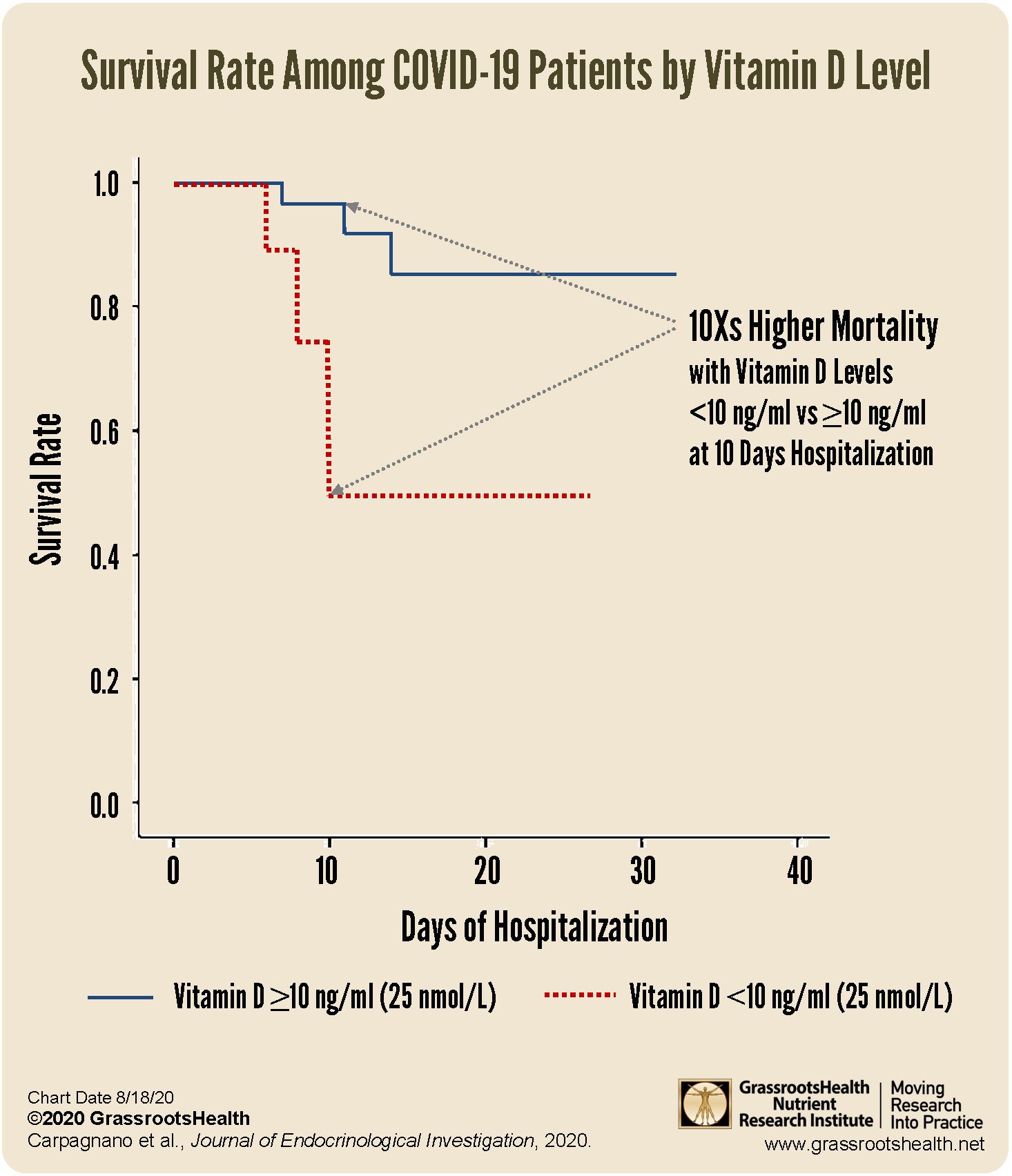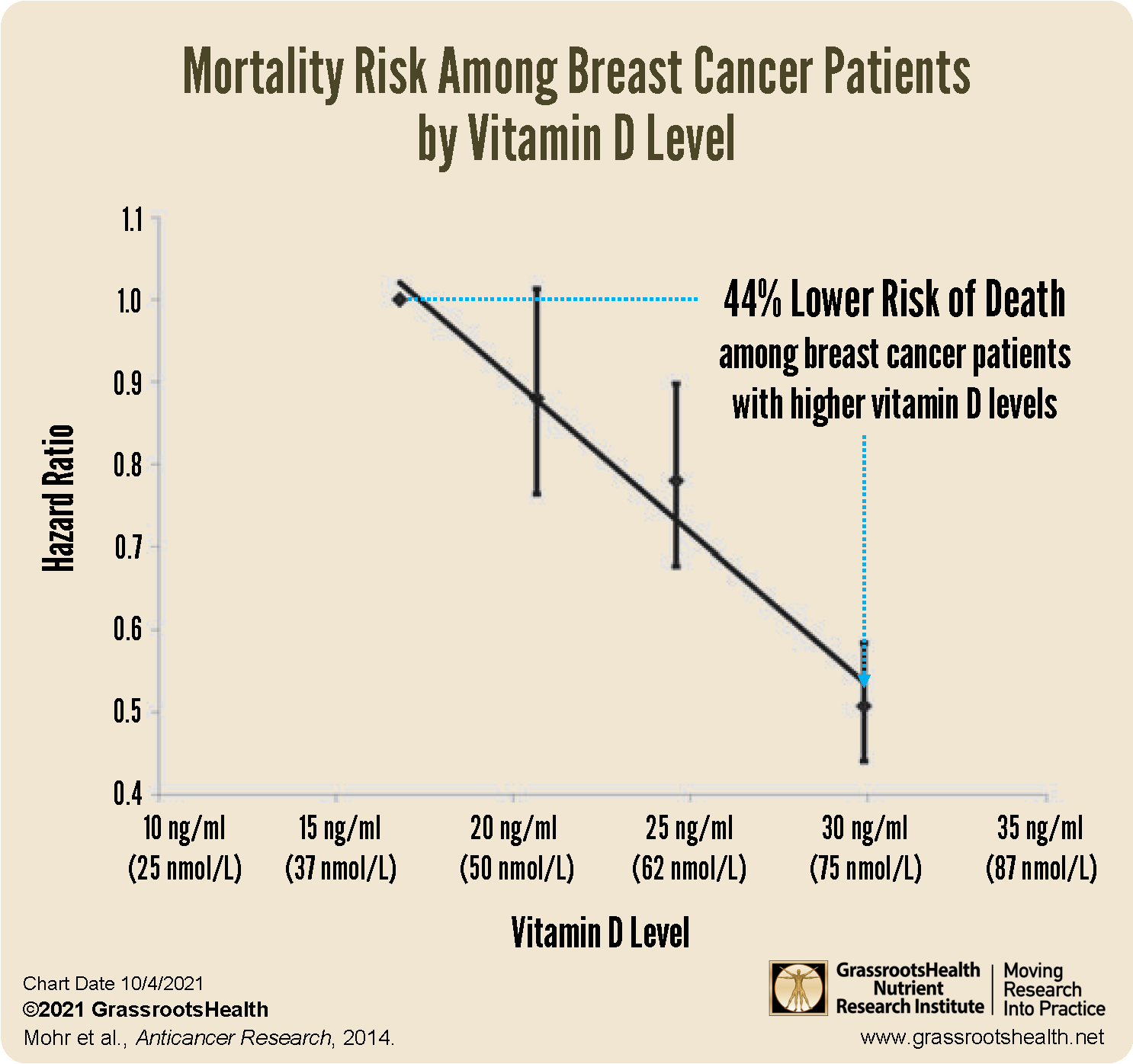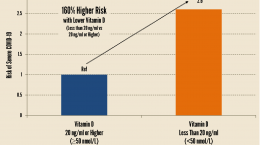Published on October 11, 2021
Could something as simple as vitamin D help predict the development or course of a disease?
Key Points
- A prognostic factor is something about an individual (such as the presence of vitamin D deficiency) that can be “used to estimate the chance of recovery or death from a disease, or the chance of the disease coming back;” prognostic significance refers to the weight or the amount of influence that specific factor puts on the expected course of a disease
- The significance of vitamin D on disease prognosis has been demonstrated by thousands of studies, on many different diseases or conditions, including breast cancer, prostate cancer and other cancers, thyroid disease, diabetes, and others
- Vitamin D intake and levels can heavily influence how many diseases progress, the chances of survival, and even getting the disease in the first place – take the necessary steps to avoid or correct a deficiency!
 Authors of a recent paper titled The prognostic significance of vitamin D deficiency in patients with COVID-19 pneumonia, reported findings similar to other studies on vitamin D and COVID-19, highlighting the impact of vitamin D on COVID-19 outcomes. In fact, many studies have now demonstrated that COVID-19 disease tends to have a more severe course in patients with vitamin D deficiency, and this study shows that correcting deficiency (defined by the authors as a vitamin D level below 30 ng/ml or 75 nmol/L), even after diagnosis, can help protect against death.
Authors of a recent paper titled The prognostic significance of vitamin D deficiency in patients with COVID-19 pneumonia, reported findings similar to other studies on vitamin D and COVID-19, highlighting the impact of vitamin D on COVID-19 outcomes. In fact, many studies have now demonstrated that COVID-19 disease tends to have a more severe course in patients with vitamin D deficiency, and this study shows that correcting deficiency (defined by the authors as a vitamin D level below 30 ng/ml or 75 nmol/L), even after diagnosis, can help protect against death.
What Does “Prognostic Significance” Mean and What is its Importance?
The term prognosis is often used in medical literature for “predicting the likely or expected development of a disease,” such as if the signs and symptoms of that disease will get better, worse, or remain the same over time. A prognostic factor is something about an individual (such as a situation, condition, or characteristic – for example, the presence of vitamin D deficiency) that can be “used to estimate the chance of recovery or death from a disease, or the chance of the disease coming back.”
Prognostic significance refers to the weight or the amount of influence that a specific factor puts on the prognosis of a disease. In the case of the paper referenced above, the authors suggest that, likely due to the need of vitamin D within the lungs and immune system (such as for helping to protect against pulmonary injury due to the cytokine storm), vitamin D status during COVID-19 disease can help determine disease prognosis. The authors conclude that vitamin D can be “…a useful, practical, and safe adjunctive approach for the treatment or prevention of COVID-19 disease…”
Vitamin D Status Has Prognostic Significance for MANY Diseases!
Vitamin D is needed by virtually every cell in the body, of all cell types, tissues, and organs, with each body system having a specific demand for vitamin D. A deficit in vitamin D can lead to impairment or disease in each of these systems. Its significance on disease prognosis has been demonstrated by thousands of studies, on many different diseases or conditions, including breast cancer, prostate cancer and other cancers, thyroid disease, diabetes, and others.
Examples of the effect of vitamin D status on disease risk has also been demonstrated, and can be seen in our Disease Incidence Prevention Charts for both general health and pregnancy and childhood.
Vitamin D intake and levels can heavily influence how many diseases progress, the chances of survival, and even getting the disease in the first place.
Getting enough vitamin D on a regular basis is important to consider as well, since a supply of each form of vitamin D is needed, especially by the cells of the immune system.
Vitamin D is an Easily Modifiable Factor to Help Improve Disease Outcomes
Don’t ever consider a situation too late to take steps for correcting or avoiding vitamin D deficiency. Measuring your vitamin D level and calculating a supplementation amount to help reach and maintain a target level, or taking loading doses to correct deficiency faster, could possibly make all the difference in how a current disease situation progresses. Test your level now!
 Having and maintaining healthy vitamin D levels and other nutrient levels can help improve your health now and for your future. Choose which to measure, such as your vitamin D, omega-3s, and essential minerals including magnesium and zinc, by creating your custom home test kit today. Take steps to improve the status of each of these measurements to benefit your overall health. You can also track your own intakes, symptoms and results to see what works best for YOU.
Having and maintaining healthy vitamin D levels and other nutrient levels can help improve your health now and for your future. Choose which to measure, such as your vitamin D, omega-3s, and essential minerals including magnesium and zinc, by creating your custom home test kit today. Take steps to improve the status of each of these measurements to benefit your overall health. You can also track your own intakes, symptoms and results to see what works best for YOU.
Enroll and test your levels today, learn what steps to take to improve your status of vitamin D (see below) and other nutrients and blood markers, and take action! By enrolling in the GrassrootsHealth projects, you are not only contributing valuable information to everyone, you are also gaining knowledge about how you could improve your own health through measuring and tracking your nutrient status, and educating yourself on how to improve it.
Help everyone Move Research into Practice with vitamin D and other nutrients! As a special birthday gift to everyone, in honor of the science, we have created a special scholarship fund for anyone to donate to that will go towards helping others participate. Your donation will allow anyone to get help with funding their participation when they need it.
Text-to-give: Text Daction to 44321 to add to our Scholarship Fund.







